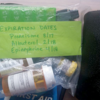If you have asthma, major weather events or disasters could affect your lung health in different ways. It’s important to be prepared to treat and control your asthma during emergencies.
Asthma flare-ups during a weather event, disaster, or another emergency can happen because of:
- Allergens in the air (pollen, mold, etc.)
- Irritants in the air (dust, smoke, fumes)
- Strong emotions (stress, fear, anxiety)
- Temperature (extreme cold or heat)
- Losing access to your treatments
RELATED CONTENT:
Wildfires and How They Affect Air Quality and Asthma – Wildfires do not only affect people closest to the fire. The wind can carry smoke very far and impact people hundreds of miles away.
Hurricanes: Weathering the Storm If You Have Asthma – Hurricanes, even tropical storms, could mean you have to evacuate depending on where you live. And if you shelter in place, there's a good chance you could be without power for days if the storm comes your way.
Create an Emergency Kit
Now is a good time to create an emergency kit with your asthma in mind. Hopefully, you never have to use it.
Keep your kit in a safe spot in your home. Make sure it is easy to find in case you need to leave in a hurry or if you have to shelter-in-place for a few days.
What should you put in an emergency kit? That depends on your specific needs. This list is a starting point:
1. Medicine, medical supplies, and equipment
The American Red Cross recommends including a 7-day supply of medicine in your emergency kit. Keep track of the expiration dates of the medicines inside the kit, starting with the medicine that expires first. You can do this by listing the contents of the kit on an index card. Ask your pharmacist for extra labels and vials so all medicines are labeled correctly.
Here are some asthma-related items you may need in your emergency kit:
- Medicines prescribed by your doctor
- Quick-relief asthma medicines
- Controller asthma medicines
- Biologic medicines (may need to be kept cool*)
- Allergy medicines, such as antihistamines and nasal sprays
- Other emergency medicines, such as epinephrine in case of severe allergic reaction or anaphylaxis
- Eczema lotions and medicines
- Other medicines that have been prescribed to you
- Spacers or valved holding chambers to be used with inhalers
- Nebulizer* (portable, battery powered options may be helpful)
- Extra tubing and nebulizer parts
- N95 masks to shield your mouth and nose from blowing dust, dirt, smoke, or other airborne asthma triggers
- First aid supplies, such as bandages, antibiotic cream, pain medicine, etc. If someone in your household is allergic to latex, make sure your kit is latex free.
TIP: *Check with your local law enforcement office or your local power company if you need electricity for medical equipment. They might be able to add you to a priority list for restoring power or have someone to check on you in case of evacuation.
2. Important paperwork
Keep printed copies of important documents with your emergency kit. You won’t have access to digital documents if phone and internet networks are down.
- Asthma Action Plans
- Lists of medicines you take and doses
- Insurance cards
- Phone numbers of family and friends in case your phone runs out of power
- Names and numbers of your doctors and pharmacies
3. Food and water
If someone in your family has food allergies, they may not be able to eat food provided by shelters. Even if the ingredients are safe, there may be the potential for cross-contact with their food allergens.
Keep at least a 3-day supply of food and water on hand for each person in your household. Have it packed and ready to go in an evacuation kit so you don’t have to find it during an emergency.
Here are some possible foods, depending on your family’s food allergy or dietary needs:
- Special medical foods and formulas
- Proteins: beef jerky, sunflower/soy/pea/peanut/other no-nut spread, tuna pouches, Spam™, canned beans, canned chicken, canned ham
- Grains: cereal, oatmeal, crackers, trail mix, cereal bars
- Produce: canned fruit, canned vegetables, applesauce
- Snacks: fruit snacks/leathers, chips, pretzels, cookies, candy, non-perishable fruit pouches or fruit cups
- Drinks: juice pouches, bottled water
- Other supplies: disposable plates, cups, utensils, manual can opener
- Pets: supply of safe food, their medicines, and bowls
Kids with Food Allergies, a division of the Asthma and Allergy Foundation of America, has more tips on preparing for emergencies when your family has food allergies.
4. Other supplies that may be helpful
- Extra chargers and portable battery packs for your phone
- Batteries
- Extension cords
- Hand wipes and hand sanitizer
- Flashlights
- Medical alert contact information, if you use such a service
- Plastic bags for trash, contaminated clothing, and supplies
- Change of clothing for each member of the family
- A deck of cards, small non-electronic games, or toys
- Hand warmers or cooling towels, depending on the weather
The Federal Emergency Management Agency (FEMA) includes 18 natural hazards to be aware of:
- Avalanche
- Coastal flooding
- Cold wave
- Drought
- Earthquake
- Hail
- Heat wave
- Hurricane
- Ice storm
- Landslide
- Lightning
- River flooding
- Strong wind
- Tornado
- Tsunami
- Volcanic activity
- Wildfire
- Winter weather
Many of these are common in various parts of the U.S. and don’t always cause major issues. But some of them may introduce asthma triggers that can cause symptoms. More serious events may have a more long-term impact. You may need to tailor your emergency kit based on potential hazards specific to your location.
Resources for Preparing for Emergencies
For more help preparing for an emergency in your area, visit these sites:
Get answers to your asthma and allergy questions on our online forums.
GET SUPPORT NOW

Comments (6)